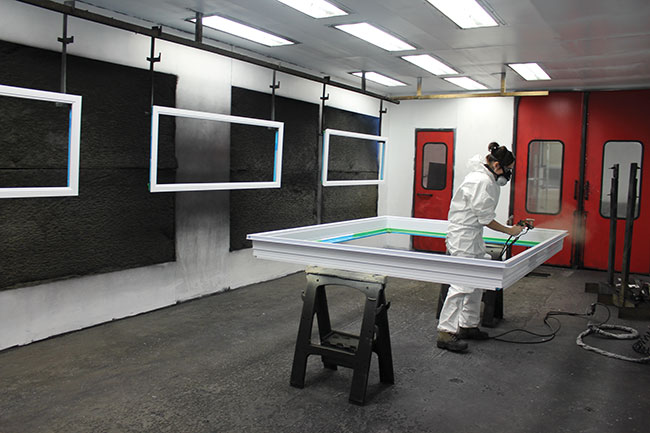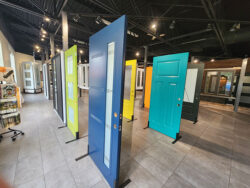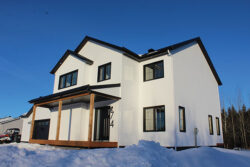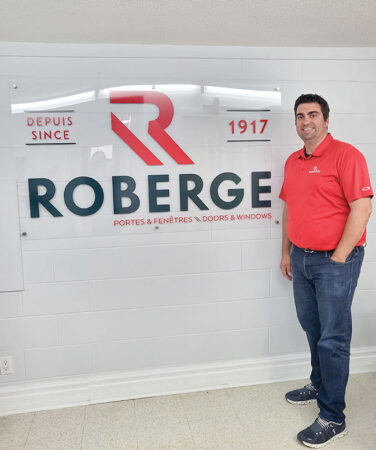
Articles
Dealer’s Corner
Windows and Time
Roberge Windows and Doors has been in business for over a century.
November 2, 2023 By Carroll McCormick
 Kate Dickey, workshop worker, busy in the La Sarre paint room.
Kate Dickey, workshop worker, busy in the La Sarre paint room. Established in 1917 in La Sarre, Que., Roberge Windows and Doors has steadily kept pace with the times, adopting newly invented materials, evolving standards and modern production methods.
The company started humbly, with founder Alexandre Roberge making wooden doors and windows by hand. With each succeeding generation of the family, the company grew in geographical reach and manufacturing sophistication: Alexandre’s 20-year-old son, Jean-Guy, joined the company in 1950, bought it in 1960, set up a production line for doors and windows, and developed a distribution network across Abitibi-Temiscamingue (an administrative region in western Quebec bordering Ontario) and northeastern Ontario. Third-generation family members – grandsons Pierre and Gaetan – joined Roberge in the late 1970s.

The La Sarre showroom in Gatineau, near Ottawa.
By the time local entrepreneurs purchased the company in 2016, the windows plant had grown to 35,840 square feet. In 2017, the new owners added 6,000 square feet of space, including, in a strategic bit of vertical integration, a paint shop.
Fortunately for La Sarre, which is just a few steps short of 700 kilometres north and west of Montreal, and almost 600 kilometres north of Ottawa, the company stayed put; it is one of La Sarre’s top five private employers. The company averages 90 employees, and peaks at about 115 in the high season, according to Simon Gaignard, co-owner and general manager. “We kept the jobs and everything in La Sarre. The company is very important to La Sarre,” he says.
Roberge’s community-mindedness includes supporting local organisations, and a bit further away, the Daniel Johnson Family House in Gatineau. As well, Roberge sponsors a local soccer club and is sponsoring Quebec weightlifter Alex Bellemare in his bid to qualify for next year’s Paris Olympics.
Roberge offers a dizzying assortment of casement, awning, sliding, hung and architectural window styles, double-and triple-glass thermopanes, exterior and interior PCV mould options, lites and grills, the choice of PVC or PVC/aluminum hybrids, and a wide range of colours.
“We have standard products on the door side, but on the window side it is all custom orders. In the showrooms we have examples and samples for customers to see. There are lots of custom options for doors if needed,” Gaignard explains.
Roberge manufactures its own doors, offering 10 panel types and a wide range of door windows, including stained glass, side windows and side panels. Patio doors are also on the menu; almost all of its door and window products are Energy Star-certified.
Roberge specializes in residential work, of which 80 percent is retrofit, Gaignard says. “We have sold some commercial windows, but they all are made with PVC/aluminum hybrid frames.”
Adding the paint shop was an astute move. “Before we built it, we had to send the doors out to be painted, then bring them back here and send them out to customers. Adding a paint shop is probably the best decision I made,” Gaignard says. “If I didn’t have that I’d lose a lot of sales. The demand for coloured products is really high. We were told that in the near future we would be buying another paint shop.”
Roberge mixes its own colours and can match colours and paper samples. “We have machines that can analyse and reproduce colours,” Gaignard notes.

A house in chilly Abitibi-Ouest sporting La Sarre windows and front door.
Another advantage of bringing product painting in-house is that it is easier to maintain a high level of quality, says Nathalie Boileau, supply and certification manager. “The more they are manipulated, the more damage is possible.” Delays and damage have declined, there is increased quality control, and Roberge can react quickly to remedy defects.
The company has a network of 31 distributors. Some are in Abitibi-Temiscamingue, others are strung out along Highway 11 from North Bay to Hallebourg – about half-way to Thunder Bay. A few more are clustered around Sudbury and Ottawa and there is a branch office and showroom in Gatineau. Customers in La Sarre can visit a Roberge showroom in their local Home Hardware, which Gaignard owns.
“Competition is fierce, so we must always listen to our customers. That’s why we are very quick to respond to their requests,” Gaignard notes. “We are very fast to resolve any problems for our customers. Our main advantage is how fast we can answer requests. For example, if a customer breaks a window, we can replace it in less than three hours. We can help customers very quickly,” Gaignard explains.
Roberge has a service team in Gatineau and a technician in La Sarre who hits the road a minimum of three days a week on the road to take care of customers. It uses subcontractors and contractors to do most installs. However, Gaignard notes, “In Gatineau we have both our own installers and a subcontractor.”
The company’s continued existence is proof that Roberge has a good handle on its supply chain management, such as inventory control and distribution across rather challenging distances. “This is why we need to keep inventory up to date. The cost of transportation is very expensive. When I am ordering material, what else can I order to make the trips worthwhile?” Boileau asks. Gaignard adds, “We use our delivery trucks to bring back supplies. We ship full and return full. We never come back with an empty truck.”
While Roberge says it is not experiencing a labour shortage (a pan-Canadian complaint since the pandemic struck) it is nonetheless a job-seekers market, Gaignard says. “We are a popular employer here in Le Sarre, but right now, when we do interviews, we have to decide very fast. If not, when we call back, they already have jobs. It is a very fast market at the moment.”
Boileau adds, “For now we are fine [with labour supply] because we have a lot of long-term employees. Most of them have been with us for over 20 years.” Roberge will hire people with no experience and train them directly on the production line. And while it does not have an apprenticeship program, Gaignard explains, “In the winter there is a program in high school to help students do internships with companies. For two years we have had one student a year who comes here from one to three days a week, working here, and continuing their schooling during the winter.”
Employee training includes health and safety training. “It includes first aid, maintenance methods such as lock-out, and we have a health and safety committee that meets four times a year. The employees like to participate and consult. When we get requests from employees, we listen to them every time. We have line inspections, safety guides, and we are changing processes to be sure everything is safe. We have safety light curtains which, if obstructed, stop the machines.” Roberge also uses Mutuelles de prevention which, according to Medial, “… is a group of companies that promotes healthy and safe workplaces for their employees.” These efforts, Gaignard points out, have reduced the rates Roberge pays to the Quebec worker’s compensation program by putting the company in a lower risk category.

Simon Gaignard is general manager and co-owner of Roberge, managing about 100 employees. The company is a major employer in La Sarre.
Quality control and product certification, always a preoccupation, is especially important now, Gaignard says. “In the past year, visits by a recognised inspection agency, which does product certification and sends the information to the certification agency, are more frequent and more strict.”
For example, Boileau says, “If we decide to change the weather stripping, we either ask for equivalences or have them re-simulated in the laboratory. We ensure conformity to the standards we require, and with getting our products certified.”
With rising interest rates tamping down demand at the moment, Roberge has put some projects on hold. “We have some projects in the near future but with the financial situation at the moment they are on hold. Renovation and construction are on hold, and now with the increase in interest rates a lot of projects have stopped,” Gaignard says.
Still, Roberge is steaming ahead with other important projects. One, under the rubric of plant optimization, includes advances such as getting automation results in real time, collecting more data, and cloud computing. “When this project is finished, we will be able to have all the information about project scheduling in real time. Inside or outside the plant, we will be able to track everything in real time,” Gaignard explains. “Now we can use a model to track [for example] our productivity. It can be used on a smaller scale; for example, counting windows coming off the production line, right up to very sophisticated work.”
From horses and gaslights to real-time automated inventory control. Who knows what the future holds?
Print this page
Leave a Reply